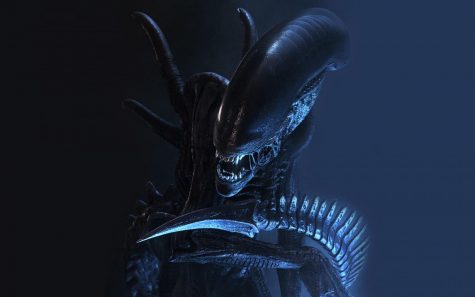“Better to reign in hell than serve in heaven”
 I’ve said it before and I’ll say it again; Ridley Scott is genuinely a mastermind. Alien: Covenant is very evidently both a sequel and a response to the brilliant, unfairly maligned, and criminally under appreciated Prometheus, and it’s an insanely nihilistic, yet deeply empathetic one at that. It’s a sequel in that it presents a logical and at times breathtaking continuation of the core themes and narrative threads of its predecessor, most noteworthily via the inclusion of Fassbender’s synthetic David, yet it’s also a sort of response, not necessarily to Prometheus but to the fan backlash that Prometheus faced. It’s as if Scott, who it seems was forced to include the xenomorph in this film, is taunting us with its presence, using the overly familiar basic plot beats we’ve come to associate with the Alien franchise (careless characters, claustrophobic sequences in which the protagonists are being hunted down by horrific monsters, an explosive finale and the surprise reveal that the creature is not actually dead, resulting in a second climactic showdown, etc.) as recurring motifs throughout Covenant in a way that’s both intentionally frustrating and insanely brilliant. The repetition and derivativity that diminished the quality of the original Alien’s three sequels is back but with a wonderfully poetic purpose.
Scott takes the nihilism, the hatred for mankind, that tinged Prometheus, gently bathing it in an illustrious and captivating darkness, and drenches Covenant in it. This is genuinely one of the cruelest, angriest films I’ve ever seen, yet surprisingly it’s all the better for it. The characters, whose stupidity finally serves a purpose– to compare their pathetic humanity to the godliness of their own creations the Synthetics– are slaughtered in gloriously gory fashion, ripped to shreds by horrific monsters as the camera gleefully ligers on their mutilated corpses. There’s such violently intense freneticism to the film’s action sequences, particularly through its first act, and such morbid and jaded fascination with said violence on Scott’s behalf.
Covenant can essentially be divided into two distinct segments, each characterized by the aspects of Alien canon that it’s riffing on. The first third is essentially a condensed Alien film, yet an engaging and subversive one. It takes the plot beats we think we know and twists them around like interchangeable stanzas of poetry, creating a number of viscerally intense sequences that feel at once both familiar and delightfully fresh. The aesthetics of the film bolster this, as the stunning locales (Covenant seems to wholeheartedly embrace the “Paradise” alluded to in Prometheus) provide a glorious backdrop for the chaos and carnage, which feel fantastically out of place amongst such stunning vistas. And yet, through his wonderfully subtle hand, Scott creates a hollowness to this world. It’s visually stunning, yet empty; there are no living beings here, save for David.
The second act of the film is the thematic meat of it. It’s simultaneously the most and least riveting in terms of suspenseful storytelling, as there’s an incredible sense of classic, slow-burn tension throughout, yet those hoping to be delivered nonstop Alien thrills throughout the entire film will undoubtedly find this portion to be the least riveting. It’s where Scott begins to pick up the pieces of Prometheus and recontextualize their thematic context within Covenant. The set design here is truly marvelous, with much of the second act taking place in subterranean caverns and a vast, abandoned city, but what’s most breathtaking about this portion of the film is the way it builds on the themes established by its predecessor.
I’ll be honest, after the divisive fan response to Prometheus, I was concerned that Scott’s vision would be crippled by an intense desire to satisfy fans who felt the most alienated, but Covenant is arguably even more theologically weighty and idealistically profound than its predecessor. Where Prometheus was a film about faith, creation, and the power of belief; a simultaneous acknowledgement that perhaps we may never find genuine answers about our creation or our place in the universe and exploration of our burgeoning desire and capacity to create, Covenant is a logical extension of these themes. As with the tension in the film, Scott ratchets the theological ideas to the max, transforming and recontextualizing entire chunks of the series’ canon in the process.
But what truly defines Covenant is its cruelty, which feels like what could simultaneously be its most appealing and offputting characteristic (in my eyes it is most certainly the former). It’s a film that treats the majority of its characters like animals for slaughter, and asks us to be okay with that. The majority of its rather large initial cast exist purely to fuel the carnage of its frenetic mayhem, and it even goes so far as to establish that each of the film’s characters is in a relationship with another (the cast being all couples makes sense given that this is a colonization mission) so that it can slaughter characters as their livers watch, heartbroken, only to be beautifully eviscerated later. There’s a particularly thrilling sequences in which a pair of characters is torn to shreds whilst fooling around in the ship’s showers.
And yet, despite this cruelty, Covenant is also a deeply empathetic film to those of its characters whom Scott views as more than just glorified blood squibs. It eatablishes substantial depth for a few of its leads, especially Walter, Fassbender’s second synthetic character in the film. The dynamics explored between Walter and David are amongst the film’s most inspired and fascinating sequences, and are perhaps key to comprehending some of its themes. Through this relationship Scott explores the idea of corruption of innocence/intelligence which can be rather fascinatingly linked back to some of the core ideas of Prometheus.
I do not wish to spoil the many surprises of Alien: Covenant, but I think that it’s enough to say that this is undoubtedly one of the year’s most fascinating films; a high-strung, tense thriller that effortlessly blends the philosophy of Prometheus with the thrills of Alien whilst also elevating both to extremes far beyond what’s reasonably expectable from a Hollywood blockbuster. Ridley Scott truly is a visionary genius.
I’ve said it before and I’ll say it again; Ridley Scott is genuinely a mastermind. Alien: Covenant is very evidently both a sequel and a response to the brilliant, unfairly maligned, and criminally under appreciated Prometheus, and it’s an insanely nihilistic, yet deeply empathetic one at that. It’s a sequel in that it presents a logical and at times breathtaking continuation of the core themes and narrative threads of its predecessor, most noteworthily via the inclusion of Fassbender’s synthetic David, yet it’s also a sort of response, not necessarily to Prometheus but to the fan backlash that Prometheus faced. It’s as if Scott, who it seems was forced to include the xenomorph in this film, is taunting us with its presence, using the overly familiar basic plot beats we’ve come to associate with the Alien franchise (careless characters, claustrophobic sequences in which the protagonists are being hunted down by horrific monsters, an explosive finale and the surprise reveal that the creature is not actually dead, resulting in a second climactic showdown, etc.) as recurring motifs throughout Covenant in a way that’s both intentionally frustrating and insanely brilliant. The repetition and derivativity that diminished the quality of the original Alien’s three sequels is back but with a wonderfully poetic purpose.
Scott takes the nihilism, the hatred for mankind, that tinged Prometheus, gently bathing it in an illustrious and captivating darkness, and drenches Covenant in it. This is genuinely one of the cruelest, angriest films I’ve ever seen, yet surprisingly it’s all the better for it. The characters, whose stupidity finally serves a purpose– to compare their pathetic humanity to the godliness of their own creations the Synthetics– are slaughtered in gloriously gory fashion, ripped to shreds by horrific monsters as the camera gleefully ligers on their mutilated corpses. There’s such violently intense freneticism to the film’s action sequences, particularly through its first act, and such morbid and jaded fascination with said violence on Scott’s behalf.
Covenant can essentially be divided into two distinct segments, each characterized by the aspects of Alien canon that it’s riffing on. The first third is essentially a condensed Alien film, yet an engaging and subversive one. It takes the plot beats we think we know and twists them around like interchangeable stanzas of poetry, creating a number of viscerally intense sequences that feel at once both familiar and delightfully fresh. The aesthetics of the film bolster this, as the stunning locales (Covenant seems to wholeheartedly embrace the “Paradise” alluded to in Prometheus) provide a glorious backdrop for the chaos and carnage, which feel fantastically out of place amongst such stunning vistas. And yet, through his wonderfully subtle hand, Scott creates a hollowness to this world. It’s visually stunning, yet empty; there are no living beings here, save for David.
The second act of the film is the thematic meat of it. It’s simultaneously the most and least riveting in terms of suspenseful storytelling, as there’s an incredible sense of classic, slow-burn tension throughout, yet those hoping to be delivered nonstop Alien thrills throughout the entire film will undoubtedly find this portion to be the least riveting. It’s where Scott begins to pick up the pieces of Prometheus and recontextualize their thematic context within Covenant. The set design here is truly marvelous, with much of the second act taking place in subterranean caverns and a vast, abandoned city, but what’s most breathtaking about this portion of the film is the way it builds on the themes established by its predecessor.
I’ll be honest, after the divisive fan response to Prometheus, I was concerned that Scott’s vision would be crippled by an intense desire to satisfy fans who felt the most alienated, but Covenant is arguably even more theologically weighty and idealistically profound than its predecessor. Where Prometheus was a film about faith, creation, and the power of belief; a simultaneous acknowledgement that perhaps we may never find genuine answers about our creation or our place in the universe and exploration of our burgeoning desire and capacity to create, Covenant is a logical extension of these themes. As with the tension in the film, Scott ratchets the theological ideas to the max, transforming and recontextualizing entire chunks of the series’ canon in the process.
But what truly defines Covenant is its cruelty, which feels like what could simultaneously be its most appealing and offputting characteristic (in my eyes it is most certainly the former). It’s a film that treats the majority of its characters like animals for slaughter, and asks us to be okay with that. The majority of its rather large initial cast exist purely to fuel the carnage of its frenetic mayhem, and it even goes so far as to establish that each of the film’s characters is in a relationship with another (the cast being all couples makes sense given that this is a colonization mission) so that it can slaughter characters as their livers watch, heartbroken, only to be beautifully eviscerated later. There’s a particularly thrilling sequences in which a pair of characters is torn to shreds whilst fooling around in the ship’s showers.
And yet, despite this cruelty, Covenant is also a deeply empathetic film to those of its characters whom Scott views as more than just glorified blood squibs. It eatablishes substantial depth for a few of its leads, especially Walter, Fassbender’s second synthetic character in the film. The dynamics explored between Walter and David are amongst the film’s most inspired and fascinating sequences, and are perhaps key to comprehending some of its themes. Through this relationship Scott explores the idea of corruption of innocence/intelligence which can be rather fascinatingly linked back to some of the core ideas of Prometheus.
I do not wish to spoil the many surprises of Alien: Covenant, but I think that it’s enough to say that this is undoubtedly one of the year’s most fascinating films; a high-strung, tense thriller that effortlessly blends the philosophy of Prometheus with the thrills of Alien whilst also elevating both to extremes far beyond what’s reasonably expectable from a Hollywood blockbuster. Ridley Scott truly is a visionary genius.




